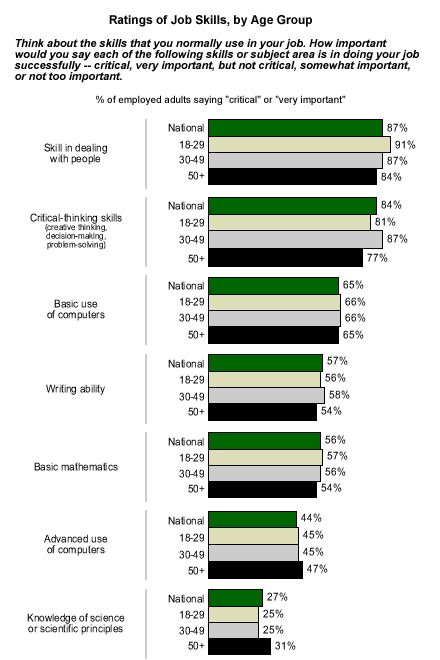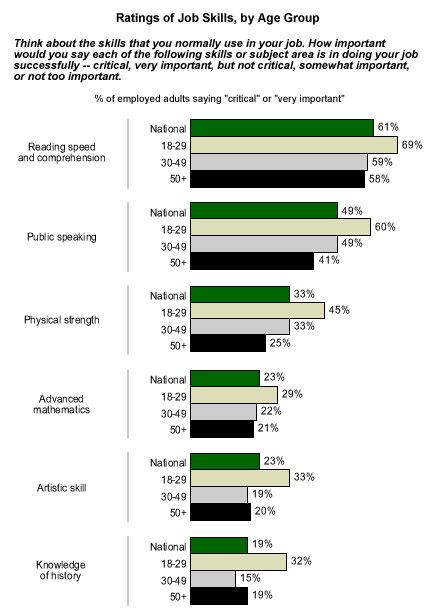Gallup asked employed adults to rate a list of 13 work-related skills and subject areas as "critical," "very important," "somewhat important," or "not too important" to doing their jobs successfully. One's age, unlike other demographic characteristics such as gender, education, and income, may have less of an influence in the type of job one has.
Like other age groups, younger working adults tend to say skills in dealing with people and critical-thinking skills are "critical" or "very important" to the type of work they do.
"Dealing with people is my No. 1 priority," said Mark Wilson, a 29-year-old systems engineer from Silver Spring, Md. "If people like you and want to include you in things, you'll go far no matter what your career."

But younger adults report that some skills are much more likely to be important to succeeding in their jobs than working adults in other age categories. For example, nearly half (45%) of the youngest working adults note that "physical strength" is critical or very important to their success at work -- 12 percentage points higher than the U.S. population overall. Younger people tend to be stronger, healthier, more energetic -- and above all, more willing to take on physically demanding work. Younger people also value certain other job skills more highly than older people do, but the explanations for those differences are not as obvious.
In addition to physical strength, young Americans are somewhat more likely than those in other age groups to say public speaking, artistic skills, and knowledge of history are important to their jobs. In the latter two instances, about one in three working 18- to 29-year-olds say these are critical or very important, while no more than 20% in any other age group says this. Many of these skills tend to be emphasized in school, and perhaps that's why young adults are more likely to feel that they are important.
Wilson was a communications major in college and credits his college courses in public speaking with encouraging his natural talent. "A genuine love of communicating," he said, "allows you to develop the skills that let you be you."
Noah Kodeck, 27, a public affairs manager in Washington, D.C., credits a course in diction at Georgetown University with giving him even more self-assurance in public speaking. "When speaking to groups about the company's role in the community," he said, "I've always had confidence in what I'm saying -- but now I have confidence in how I'm saying it."

Bottom Line
It appears as if those who most recently left school for the workforce are more likely to say that standard school subjects such as history are more relevant to success in the type of job they do. However, this does not extend to all areas of school instruction. While educators emphasize the importance of math and science -- two areas in which American kids lag behind other developed nations -- younger working adults are no more or less likely to say these are relevant to their jobs than other American workers are. However, the critical-thinking skills that these subjects help develop are valued by Americans of all ages.
*Results are based on telephone interviews with 588 adults employed full or part time, aged 18 and older, conducted Aug. 4-6, 2003. For results based on the total sample of national adults, one can say with 95% confidence that the margin of sampling error is ±4 percentage points.